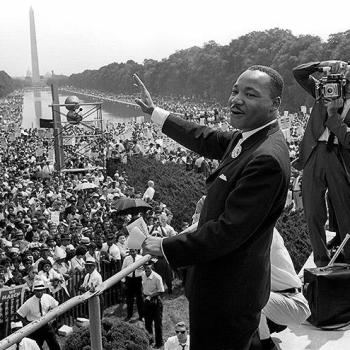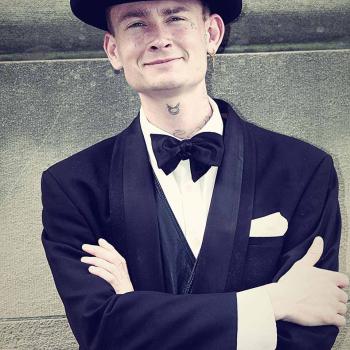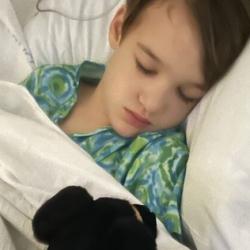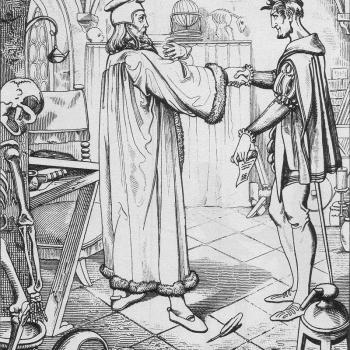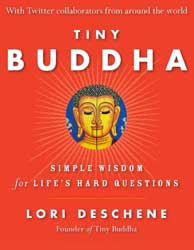 Now Featured at the Patheos Book Club
Now Featured at the Patheos Book Club
Tiny Buddha: Simple Wisdom for Life's Hard Questions
By Lori Deschene
A Q&A with Lori Deschene
Tell us a bit about how Tiny Buddha started?
Originally, Tiny Buddha was a Twitter account, offering a daily quote. When I started, I'd been working long hours, on the web from home, and tweeting once a day was something I could easily do to use technology a little more meaningfully.
After a year, the Twitter account had more than 20,000 followers. I was amazed by how many people retweeted the quotes, and I wondered about all of them—what their lives looked like, and what they did with those ideas when they shut down their computers or put down their gadgets.
I knew firsthand that it's a lot easier to gain knowledge than it is to apply it. So my idea for the site was to create a community blog where anyone could share a story about taking wisdom off the page. That was in September of 2009. Since then, more than 175 people have shared their experiences and on the site.
It's grown into the community I hoped it would be—a place where we can all share our struggles, successes, and insights honestly and help and support each other.
How has the Tiny Buddha community changed your life?
The Tiny Buddha community has reinforced what I've spent years fully learning: people are good, they care, and they want to help each other.
As I wrote in my book, I isolated myself for a long time when I was younger. I hated myself, so I felt paralyzed when I engaged with other people. I didn't know how or who to be to ensure I wouldn't be seen as intrinsically flawed, and then, as a result, hurt.
The Tiny Buddha community reminds me every day that we are all very similar, and we can all make a positive difference in each other's lives by being honest about our experiences and then helping each other.
Readers bring so much love, compassion, and kindness to the site and the social media pages. That makes a huge difference in my life, and I'm grateful!
You've shared so many inspiring quotes with the world over the past few years, which ones inspire you the most?
"If you light a lamp for someone else, it will also brighten your path." ~Buddha
"I am convinced that life is 10% what happens to me, and 90% how I react to it." ~Charles R. Swindoll
"If you let go a little, you will have a little peace. If you let go a lot, you will have a lot of peace." ~Ajahn Chan
Tell us about your new book. When/Where can we purchase it?
I started by asking @tinybuddha Twitter followers a number of the most challenging questions in life, including: What's the meaning of life? Why is there suffering in the world? What does it take to be happy? Can people change—and how? Nearly 1,000 people responded, but ultimately, I chose 200 tweets to weave throughout the book.
I realized that there really aren't concrete right and wrong answers to these questions, and I wanted to shape the book around this idea: that there are many possible ways to look at the big issues in life. We all need to find the answers that make sense to us individually, and then utilize those answers well for our individual and collective peace and happiness.
I included many of my own personal stories, because my reflections come from my experiences. It was liberating, cathartic, and empowering to share a little of where I've been and what I've learned, beyond the stories I've shared on the site.
I hope readers finish the book knowing that even in a highly uncertain world we have a lot of power to be the people we want to be and live the lives we want to lead.
Tiny Buddha: Simple Wisdom for Life's Hard Questions is available through Amazon, Barnes & Noble, and other independent book sellers, on- and offline. You can find those links at http://tinybuddhabook.com.
In your book you are very honest about your past hurt, and you talk about pain being a teacher. What are some of the greatest lessons pain has taught you?
The first is that I have a say in how I experience pain. I'm going to lose things in life, and deal with the full range of emotions over and over again, as we all will, but I can choose not to prolong my suffering. I can choose to sit with my feelings, learn from the experience, and then let go and move forward, stronger and wiser, instead of dwelling on stories about what happened.
Another thing I've learned through pain is that self-awareness is one of the cornerstones of peace. When I can take an honest look at what's going on in my head, I can make positive change to prevent future pain and conflicts in relationships.
